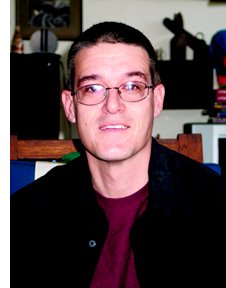Excerpts from the interview:
“Originally Perfect Circle was called The Glass Coffin. It was set in Los Angeles, where the main character met an aging actress ('aging' in the sense of 34, not 60) who is putting together a kind of last-chance star vehicle, and the book was about that movie. I was about two days from finishing the first draft when I saw a New Yorker review of a film I had never heard of, The Sixth Sense, and thought, 'Oh damn!' My idea about a guy who sees ghosts had seemingly occurred to someone else....
 “There were things I really liked about Coffin that were hard to let go of, but I felt there was an emotional heart to it that I had not found yet. So eventually I transposed it back into Texas one more time, out of movies and back into family. That seemed to make a big difference for its inner life, and I think it's a much stronger book.
“There were things I really liked about Coffin that were hard to let go of, but I felt there was an emotional heart to it that I had not found yet. So eventually I transposed it back into Texas one more time, out of movies and back into family. That seemed to make a big difference for its inner life, and I think it's a much stronger book.
“You think you can write about things that are interesting to you, but often you really can't. I'm interested in movies and in L.A., but it's not the same. There are the things you see with your eye and the things you see with your heart, and you can tell the difference when a writer is working on one and not the other -- or at least I can tell the difference in my own work. It's becoming clear that this Texan writes about family a lot! I wasn't Will Kennedy but I knew him and I had friends who went to most of those places.”
*
“Between starting and finishing Perfect Circle, I've had this entire second career develop, essentially because of a chance meeting with Neal Stephenson at a group signing. Over the years he's passed things along to me, so when Kathy Kennedy (Steven Spielberg's producer) asked him if he was interested in working on a big, bizarre promo project for A.I., he politely declined but suggested they talk to me. Jordan Weisman (who was then at Microsoft) called me up and, at a pivotal moment in our long, pleasant conversation, he paused and said, 'By any chance, do you happen to know what a roleplaying game is?' I said, 'If what you're asking is whether I ever played Empires of the Petal Throne with the Runequest damage tables, yeah, I would be that guy.' I admitted that I had played some 35 different roleplaying games and had written four or five of my own. And that turned out to be a good thing.”
*
“We placed a couple of bets: that you could take a story and smash it into a million pieces and people would enjoy finding them and putting them together (it would give them ownership of the story, because they would be making it), and that we could put a clue in a newspaper in Istanbul in the morning, and a kid in Idaho would be poring over it that afternoon; that's what the Internet means. So we put in a little rabbit hole in the trailer for A.I. -- an extra credit for 'Jeanine Salla, Sentient Machine Therapist' -- and waited until somebody was curious enough to Google her. She had a web page with links to lots of other believable pages. Our informal nickname for this game was 'The Beast', because it had 666 things on its preliminary asset list, and the name just stuck.”
*
“Similarly, with 'I Love Bees' (which started out as a marketing campaign for the Xbox game Halo 2), Elan and I, along with Jane McGonigal and Jim Stewartson, did this sort of giant War of the Worlds radio drama over pay phones. You'd be walking around and a phone would ring next to you, and your head would shoot around because there was a chance that this wasn't going to be ordinary life but a more charged or exciting life. In order to keep people from picking up the phone and being completely freaked out by the sounds of gunfire or whatever, we had a little password you needed to say in order to get there....
“The technical term for those of us running the show is 'puppet master.' We were trying to do a kind of science fiction story/radio/flash-mob-experience narrative. Over two million people got onto the website, and on an average week when we did updates we'd get maybe 150,000 hits and many, many terabytes of download. One of the fun things for me was getting to fly down to L.A. and do most of the direction with the voice-over actors. That was nice, because writing is not by nature very collegial but these games are a lot more like the theater: you get to work with other people, both to workshop things and to deal with the actors. And now I know a whole new set of studio jargon.”


